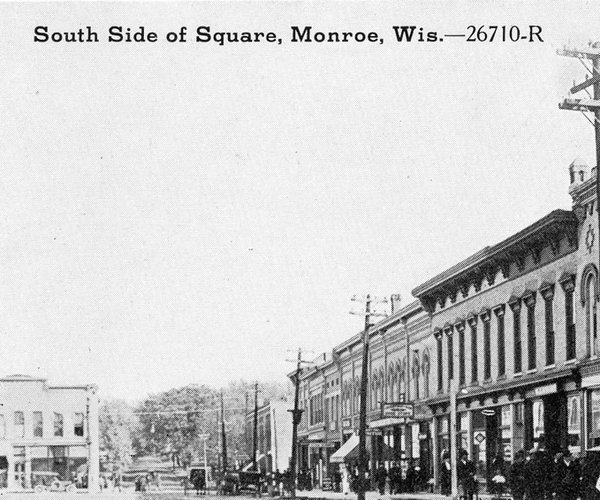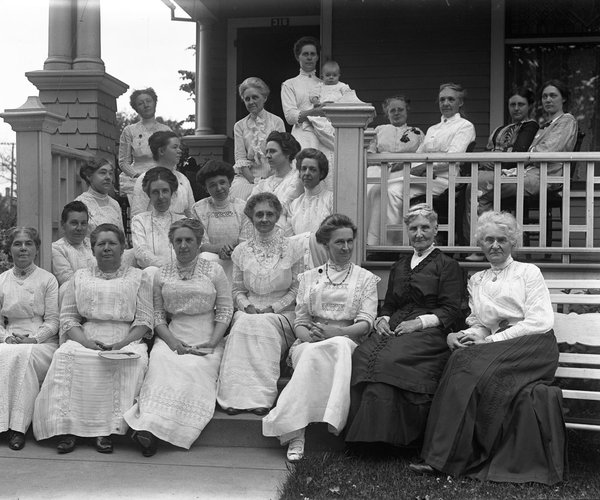The wonderful, generous people of Monroe, a village of about 3,470 people at that time, were touched by this and did what they could to help the Chicagoans.
The Monroe Sentinel had three articles in the paper three days later. One described the devastation of the fire by saying, “The Giant City of the Prairies is in ruins — complete.” Another article in that issue said that a Citizen’s Relief meeting had already been held on Tuesday afternoon at 2:00 p.m. in Union Hall where D. R. Davenport was elected chairman. A committee of seven (J. B. Treat, John Bolender, Wm Chadwick, Benj Lemont, Patrick Sheehan, J. J. Tschudy, and A. Witter) was appointed to solicit contributions of cooked provisions to be sent to “the sufferers from the Chicago fire.” Anything collected was to be shipped on the early train on Wednesday morning. A committee of two was to take the provisions to “some general committee in Chicago to be distributed among the sufferers in Chicago.”
Another article said that within six hours of the notice given, the generous people of Monroe had provided a carload of “nicely prepared meat, bread, bake [sic] and other food.” It was packed into boxes and barrels and shipped that morning under the leadership of H. W. Whitney, John Bolender, D. S. Young, and N. Churchill. In addition, Janesville, Madison, Freeport, Oshkosh, Milwaukee, Racine, and Whitewater had also sent carloads of provisions. Monroe, as well as other small cities planned to send food until “enough” was spoken. The committee was asking for people to donate “Boiled eggs, cooked beef, mutton, hams, pork, fowls, bread, doughnuts, cake, cookies, biscuits, cheese, crackers, etc. Let it not be said in after years that any person, who could do so, let the opportunity pass without contributing to the comfort of the hundred thousand homeless people of Chicago.” Contributions from the rural areas of the county were also expected since committees were already forming in nearly every township. Provisions were to be taken to the store previously occupied by J. Bolender by Tuesday evening at 9:00. The meeting adjourned at 7:30.
A Ladies’ Relief Society was formed on Friday, October 13 with Mrs. L. G. Booth elected as president. Other officers were Mrs. L. Wolcott, Mrs. Maggie Gardner, and Helen Bingham. Mrs. E. R. Copeland, Mrs. A. J. High, Mrs. Chas Pike, Mrs. A. Witter, and Mrs. J. B. Treat were the directors. This society was intended as a permanent institution so that they could act in all emergencies like this one. Miss Julia Galusha was recognized as the originator, but her duties as a school teacher prevented her from being chosen as the president.
By Wednesday, October 18, they had received 18 eight-pound comforters, 9 sheets, 28 pairs of gents’ drawers, 18 pairs of women’s drawers, 20 pairs of children’s drawers, 24 children’s shirts, 3 children’s skirts, 4 boys’ shirts, 38 women’s and children’s dresses, 11 children’s aprons, 6 women’s under wrappers, and 4 little boys’ suits.
Some of the locals also lost merchandise in the fire. Mr. Chenoweth had informed the Sentinel, which published on October 18, that the Monticello Manufacturing Company lost about $1,000 worth of cloths in a commission house. A Mr. Kerr, of Monroe, had lost a quantity of tobacco.
A card from the Julius Bauer & Co. was printed in the same issue. They had formerly been located at 67 Washington Street, but were at 270 Michigan Avenue on October 16. It stated, “Our extensive warerooms with their entire contents are gone, but our COURAGE and ENERGY remain undiminished. We are already in receipt of a large supply of Pianos and other Musical Instruments from our New York and Baltimore branches, and a still larger stock is underway at present.” They assured the public that they would be ready to supply merchandise to them soon.
I thought that it was interesting that the Peshtigo fires, which occurred on the same day as the Chicago fire, in northeastern Wisconsin was hardly mentioned in the Sentinel. This fire lasted for three days and destroyed 1,875 square miles of property including 12 communities; more than 1,200 people were killed. The Ladies’ Aid Society held a meeting at the residence of Mrs. E. R. Copeland on Monday evening, October 23 and decided to hold a “bee” at Turner Hall on Friday, the 25th. The plan was to make 100 “bed comforts for the relief of the poor of the Green Bay region.” Every benevolent woman in the area, who could contribute a half or a whole comfort (without the batting, which would be purchased by the relief committee) was invited to attend. Each woman was to bring a tacking needle or two, a thimble, a pair of scissors or shears, and a quilting frame if they had them. The last sentence said, “Gentlemen who will take hold and help will be cordially invited.”
It was reported on November 8 that the town of Cadiz had sent 15 good bed comforters to be forwarded to Green Bay with the 85 from Monroe. The Boston Belting Company also sent $250 for the aid of the sufferers from the northern fires. Mayor Luddington, Milwaukee mayor, acknowledged receipt of $3,000 from the New York Herald Fund for the Wisconsin sufferers. A $15,000 gold draft was also received from the Mayor of San Francisco.
An additional tidbit in the same paper stated that 39 families in Humboldt, Brown County, had been burned out and lost houses, barns, crops, and more. In the town of Green Bay, 68 farmers were burned out. Most of those people lost everything they had, except a few who saved some of their buildings.
The people of Monroe continue to be generous and help others when they can.
— Matt Figi is a Monroe resident and a local historian. His column will appear periodically on Saturdays in the Times. He can be reached at mfigi48@tds.net or at
608-325-6503.




